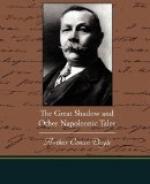What he said proved to be true, for a minute later down came the colonel with orders that we should pile arms and bivouac where we were; and there we stayed all day, while horse and foot and guns, English, Dutch, and Hanoverians, were streaming through. The devil’s music went on till evening, sometimes rising into a roar, sometimes sinking into a grumble, until about eight o’clock in the evening it stopped altogether. We were eating our hearts out, as you may think, to know what it all meant, but we knew that what the Duke did would be for the best, so we just waited in patience.
Next day the brigade remained at Hal in the morning, but about mid-day came an orderly from the Duke, and we pushed on once more until we came to a little village called Braine something, and there we stopped; and time too, for a sudden thunderstorm broke over us, and a plump of rain that turned all the roads and the fields into bog and mire. We got into the barns at this village for shelter, and there we found two stragglers—one from a kilted regiment, and the other a man of the German Legion, who had a tale to tell that was as dreary as the weather.
Boney had thrashed the Prussians the day before, and our fellows had been sore put to it to hold their own against Ney, but had beaten him off at last. It seems an old stale story to you now, but you cannot think how we scrambled round those two men in the barn, and pushed and fought, just to catch a word of what they said, and how those who had heard were in turn mobbed by those who had not. We laughed and cheered and groaned all in turn as we heard how the 44th had received cavalry in line, how the Dutch-Belgians had fled, and how the Black Watch had taken the Lancers into their square, and then had killed them at their leisure. But the Lancers had had the laugh on their side when they crumpled up the 69th and carried off one of the colours. To wind it all up, the Duke was in retreat in order to keep in touch with the Prussians, and it was rumoured that he would take up his ground and fight a big battle just at the very place where we had been halted.
And soon we saw that this rumour was true; for the weather cleared towards evening, and we were all out on the ridge to see what we could see. It was such a bonny stretch of corn and grazing land, with the crops just half green and half yellow, and fine rye as high as a man’s shoulder. A scene more full of peace you could not think of, and look where you would over the low curving corn-covered hills, you could see the little village steeples pricking up their spires among the poplars. But slashed right across this pretty picture was a long trail of marching men—some red, some green, some blue, some black—zigzagging over the plain and choking the roads, one end so close that we could shout to them, as they stacked their muskets on the ridge at our left, and the other end lost among the woods as far as we could see. And then on other




